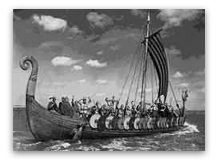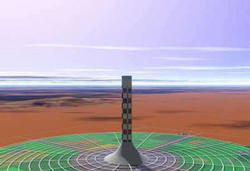 This article is using Medieval Iceland to try to illustrate how a stateless legal order can actually work. This article is using Medieval Iceland to try to illustrate how a stateless legal order can actually work."The settlers of Iceland divided the country into 4 regions. Each region had 9 godord and the godord were divided into three things. The godord were divided into groups of three and each thing had three godord.
The word 'godord' has two definitions. Godord represented a group of men. These men gave allegiance or alliance to a specific godi. A godi is the leader or chief who constructed a place of worship for his pagan followers. The godord was also a collection of rights, the right to represent the law making body of Iceland.
David Friedman states, "…seats in the law-making body were quite literally for sale." These men who were law-makers did not have power just because they held the title godord. They were powerless "unless he could convince some free-farmers to follow him." This kept tyranny and injustice in check.
Jesse Byock states in his book that, "leadership evolved in such a way that a chieftain's power and the resources available to him were not derived from an exploitable realm." This was because free farmers could change allegiance between godi without moving to a new geographical location. "The legal godi-thingman bond was created by a voluntary public contract." The ability to switch legal systems with out moving, is key to a decentralized system. It creates secession down the level of the individual, making all governance structures formed truly voluntary." OK, so the key seems to be that people can decide and change their vote for representation in real time, so nobody can hold on to power from being elected as the ruler of some geographical region. If I don't like what my representative is doing, I switch to another one. That sounds good. But the article goes on to somehow conclude that it would make sense to make corporations run our legal system, which I certainly couldn't agree with.
[ Politics | 2003-01-04 23:54 | 0 comments | PermaLink ]
|
 A 1,000m tall tower is planned as part of a huge 200MW solar power plant in the Australian outback. The air under a 4 mile diameter circle of glass would be heated by the sun, and the heat would rise up into the tower where turbines would convert it into electricity. It is planned to be completed in 2006, at a cost of A$1b and would be by far the tallest free-standing structure in the world.
A 1,000m tall tower is planned as part of a huge 200MW solar power plant in the Australian outback. The air under a 4 mile diameter circle of glass would be heated by the sun, and the heat would rise up into the tower where turbines would convert it into electricity. It is planned to be completed in 2006, at a cost of A$1b and would be by far the tallest free-standing structure in the world. This article is using Medieval Iceland to try to illustrate how a stateless legal order can actually work.
This article is using Medieval Iceland to try to illustrate how a stateless legal order can actually work.